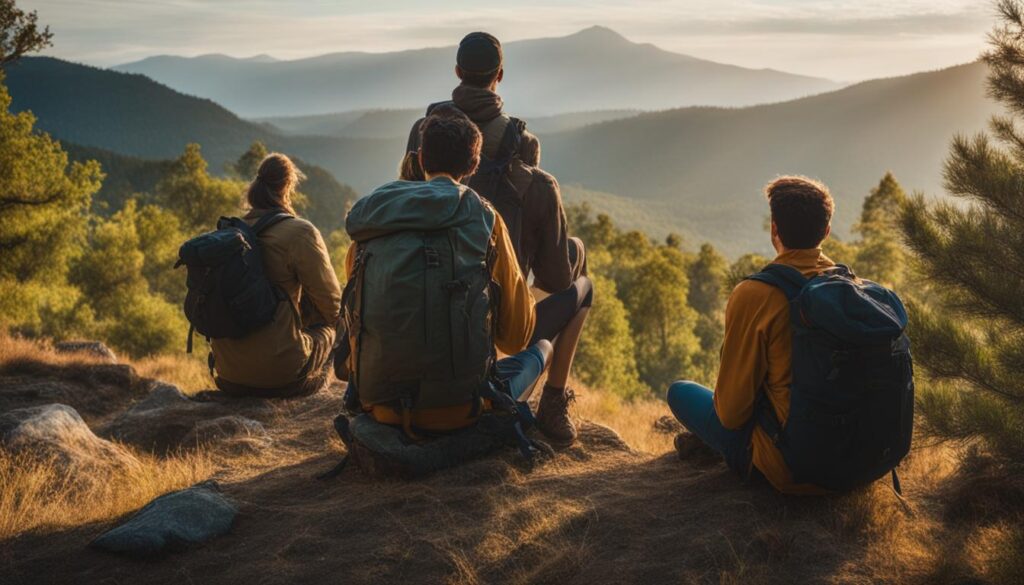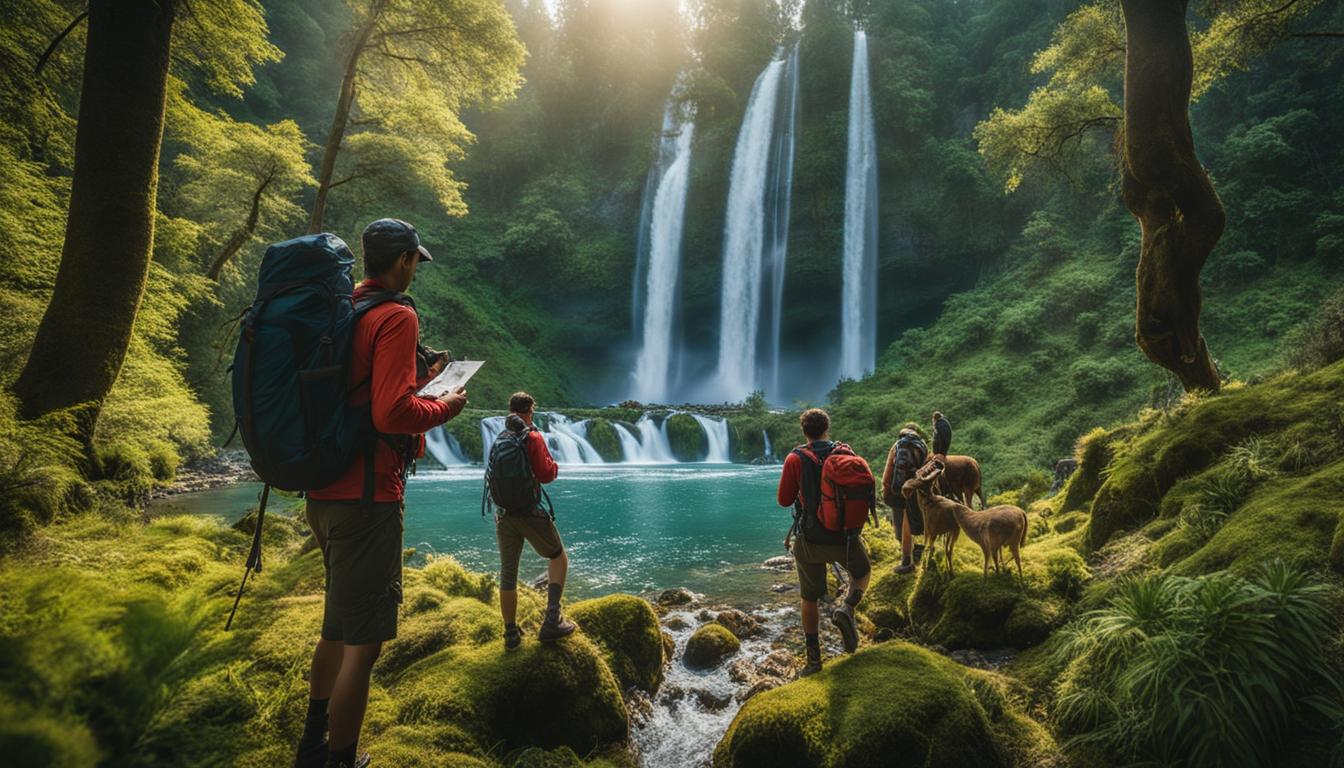I’m excited to share some insights about the fascinating connection between backpacking and wildlife conservation. As summer approaches and travel restrictions ease, many Americans are gearing up for outdoor adventures. It’s important to recognize the role that backpackers play in preserving wildlife and their habitats.
Key Takeaways:
- Backpackers can have a significant impact on the behavior patterns of wild animals and birds.
- Outdoor recreation, including backpacking, can negatively affect local wildlife and ecosystems.
- By practicing responsible backpacking, such as keeping a distance from wildlife and respecting closed areas, backpackers can contribute to the preservation of wildlife and their habitats.
- Responsible wildlife watching tips, such as observing from a distance and avoiding feeding, can minimize disturbance to wildlife.
- By balancing enjoyment with conservation, backpackers can protect and conserve nature’s beauty for future generations.
The Impact of Backpacking on Local Wildlife and Ecosystems
Outdoor recreation, including backpacking, can have negative effects on wildlife. Behavioral changes, such as animals fleeing, decreasing feeding time, or abandoning nests and dens, are common signs of disturbance. Moreover, human activities can degrade the habitat that wild species rely on for food, shelter, and reproduction. Factors like human voices, off-leash dogs, and campsite overuse can make the habitat unusable for many wild species. It’s essential for backpackers to be mindful of their actions and minimize their impact to preserve local wildlife and ecosystems.
“The presence of backpackers in natural areas can disrupt wildlife behavior and cause long-term disturbances to these fragile ecosystems,” explains wildlife biologist Dr. Emily Johnson. “It’s crucial for backpackers to understand that their actions can have far-reaching consequences and take active steps to minimize their ecological footprint.”
One way backpacking can contribute to wildlife preservation is by adhering to Leave No Trace principles. These principles guide backpackers on how to minimize their impact on the environment and wildlife. They include practices such as staying on designated trails, disposing of waste properly, and respecting wildlife by observing them from a distance. By following these principles, backpackers help ensure that their enjoyment of the outdoors doesn’t come at the expense of local wildlife and ecosystems.
To further illustrate the impact of backpacking on local wildlife and ecosystems, the following table provides examples of common disturbances caused by human activities:
| Human Activity | Effects on Wildlife |
|---|---|
| Uncontrolled campfires | Destroying habitat, causing displacement of wildlife |
| Off-trail hiking | Trampling vegetation, disrupting nesting sites |
| Garbage left behind | Attracting scavengers, risking entanglement or ingestion |
| Unleashed pets | Chasing, injuring, or spreading diseases to wildlife |
Balancing Backpacking Enjoyment with Wildlife Conservation

When embarking on a backpacking adventure, it is essential to strike a balance between enjoying the experience and preserving wildlife and their habitats. By following a few responsible wildlife watching tips, backpackers can ensure that their presence has minimal impact on the natural environment.
First and foremost, it is crucial to keep a respectful distance from wild animals. While some species may become habituated to human presence at close range, many others may become stressed or endangered. Observing wildlife from afar allows them to carry on with their natural behaviors without disturbance. Remember, it is their home, and we are merely visitors.
Respecting closed areas and staying on designated trails are also vital for protecting critical habitats. These closed areas are often off-limits to humans to allow for undisturbed nesting, breeding, or feeding grounds. By adhering to these restrictions, backpackers can help maintain the delicate balance of the ecosystem and prevent unnecessary stress on wildlife populations.
A proactive approach to wildlife conservation involves getting involved in educational or volunteer programs. These opportunities allow backpackers to learn more about wildlife and contribute to the preservation of undisturbed areas. By supporting conservation efforts through active participation, we can ensure that future generations can also enjoy the wonders of nature.
Responsible Wildlife Watching Tips for Backpackers:
- Observe wildlife from a distance and avoid approaching or following them.
- Avoid feeding animals, as it can alter their natural behavior and expose them to danger.
- Control pets or leave them at home to prevent disturbances to wildlife.
- Take only photos and memories, refraining from taking rocks or plants as mementos.
By practicing responsible wildlife watching and embracing the principles of conservation, backpackers can enjoy their adventures while leaving minimal trace on the environment. Let us cherish the beauty of nature and ensure that it remains untouched for generations to come.
| Responsible Wildlife Watching Tips for Backpackers |
|---|
| Observe wildlife from a distance and avoid approaching or following them |
| Avoid feeding animals, as it can alter their natural behavior and expose them to danger |
| Control pets or leave them at home to prevent disturbances to wildlife |
| Take only photos and memories, refraining from taking rocks or plants as mementos |
Remember, responsible backpacking goes hand in hand with wildlife conservation. By adopting these tips and respecting the natural world around us, we can ensure the preservation of wildlife and their habitats for future generations to enjoy.
Responsible Wildlife Watching Tips for Backpackers

When venturing into the great outdoors, it’s important for backpackers to practice responsible wildlife watching. By following these tips, we can ensure the well-being of the wildlife we encounter:
1. Observe from a Distance
To minimize disturbance and stress to wild animals, it’s crucial to maintain a safe distance. Use binoculars or zoom lenses to observe animals from afar, allowing them to behave naturally without feeling threatened or agitated. Remember, getting too close can disrupt their natural behaviors and potentially endanger both the wildlife and yourself.
2. Avoid Approaching or Following
Respect the personal space of wildlife by refraining from approaching or following them. Give them the freedom to move and behave as they naturally would. Remember, the goal is to observe and appreciate, not to disrupt or interfere with their daily activities.
3. No Feeding of Animals
Feeding wild animals can have detrimental effects on their health and behavior. It can lead to dependency on human sources of food and alter their natural foraging patterns. Additionally, feeding can attract unwanted predators and put both the animals and humans in danger. Always remember that wild animals have their own sources of food and should not rely on human handouts.
4. Control Pets or Leave Them at Home
If you’re backpacking with pets, it’s vital to keep them under control and follow local regulations. Unleashed dogs can disrupt and stress wildlife, potentially leading to conflicts or accidents. To ensure the safety of both your pets and the wildlife, keep them on a leash or consider leaving them at home when venturing into sensitive natural areas.
5. Take only Photos and Memories
Preserve the natural habitat and ecosystem by refraining from taking rocks, plants, or other natural objects as souvenirs. Leave everything as you found it, allowing the environment to remain undisturbed for future visitors and the wildlife that call it home. Take photos and create memories instead, capturing the beauty of nature without leaving a negative impact.
| Responsible Wildlife Watching Tips | |
|---|---|
| Observe from a Distance | By maintaining a safe distance, wildlife can behave naturally without feeling threatened or agitated. |
| Avoid Approaching or Following | Respect the personal space and freedom of wildlife by refraining from approaching or following them. |
| No Feeding of Animals | Feeding wild animals can disrupt their natural foraging patterns and attract unwanted predators. |
| Control Pets or Leave Them at Home | To avoid disturbing wildlife, keep pets under control or consider leaving them at home. |
| Take only Photos and Memories | Preserve the natural environment by not taking rocks, plants, or other natural objects as souvenirs. |
Conclusion
Backpacking and wildlife conservation go hand in hand. As backpackers, we have a responsibility to understand and minimize our impact on local wildlife and ecosystems. Our presence can alter the behavior patterns of wild animals and birds, and even degrade their habitats. But with awareness and responsible actions, we can make a positive difference.
By balancing our enjoyment with wildlife conservation, we can ensure a harmonious coexistence. It starts with keeping a respectful distance from wild animals, allowing them to live undisturbed. Respecting closed areas and staying on designated trails is crucial to protect critical habitats.
As backpackers, we can also contribute by getting involved in educational or volunteer programs. This allows us to learn more about wildlife and help maintain undisturbed areas. It’s a rewarding way to give back and ensure the preservation of wildlife and their habitats.
Remember, responsible wildlife watching is key. Observing animals from a distance, avoiding feeding them, and controlling our pets are important practices. Taking only photos and memories, and leaving nature undisturbed, helps preserve the delicate balance of the ecosystem.
FAQ
How does backpacking impact wildlife and ecosystems?
Backpacking can disrupt the behavior patterns of wild animals and birds. It can also degrade their habitat, affecting their food, shelter, and reproduction.
What are common signs of disturbance in wildlife caused by backpacking?
Common signs of disturbance include animals fleeing, decreasing feeding time, and abandoning nests and dens.
How can backpackers minimize their impact on wildlife?
Backpackers can minimize their impact by keeping a distance from wild animals, respecting closed areas, staying on designated trails, and avoiding feeding animals.
Should backpackers bring their pets on their backpacking adventures?
It is advisable to either control pets or leave them at home to prevent disturbances to wildlife.
What can backpackers do to contribute to wildlife conservation?
Backpackers can contribute to wildlife conservation by practicing responsible wildlife watching, getting involved in educational or volunteer programs, and leaving nature undisturbed by not taking rocks or plants as mementos.

